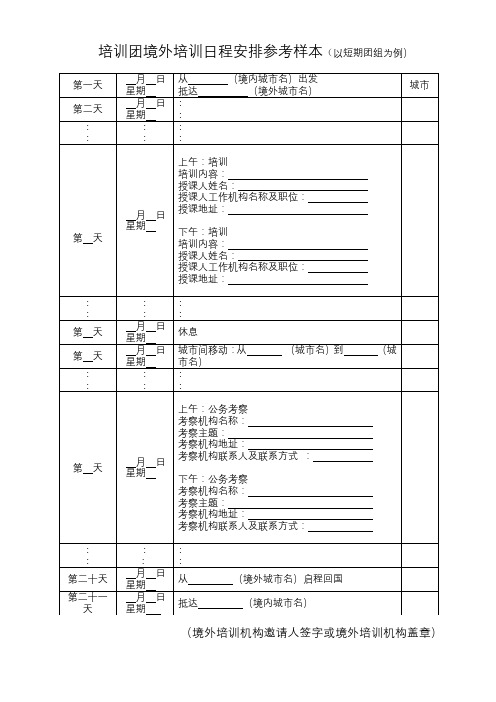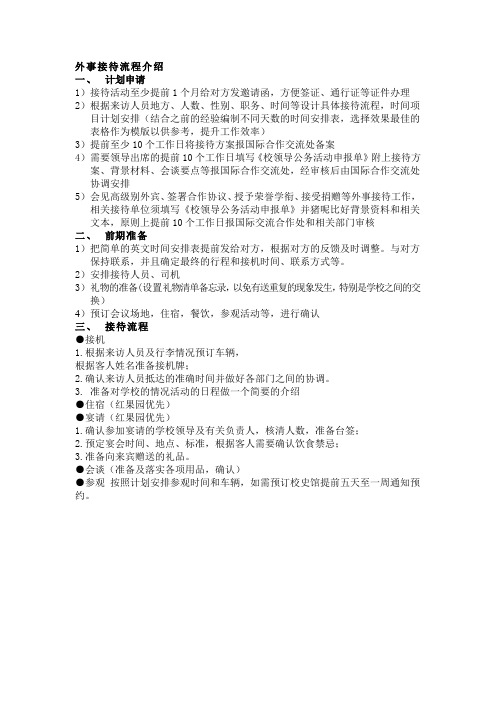外事英语培训访问日程安排
- 格式:ppt
- 大小:356.00 KB
- 文档页数:9

英语培训机构周计划安排Monday9:00 am - 10:00 am: Staff meetingThe week kicks off with a staff meeting to discuss the goals and objectives for the week. This is a time for teachers and administrative staff to come together and plan the week's activities.10:00 am - 12:00 pm: Lesson planningTeachers will spend the morning working on their lesson plans for the upcoming week. This includes preparing materials, creating activities, and setting learning objectives for their students.12:00 pm - 1:00 pm: Lunch breakStaff members have a one-hour lunch break to recharge and refuel for the afternoon activities.1:00 pm - 3:00 pm: Student assessmentsThis time is dedicated to assessing the progress of the students and identifying areas for improvement. Teachers will review student work, conduct tests, and provide feedback to help students meet their learning goals.3:00 pm - 5:00 pm: Marketing and promotionAdministrative staff will focus on marketing and promoting the institution to attract new students. This may include social media posts, updating the website, and reaching out to potential clients.Tuesday9:00 am - 10:00 am: Teacher trainingTeachers will participate in a training session to strengthen their teaching skills and learn new methodologies for English language instruction.10:00 am - 12:00 pm: Student workshopsStudents will participate in workshops that focus on developing specific language skills, such as speaking, writing, or listening. These workshops are designed to provide practical and interactive learning experiences for the students.12:00 pm - 1:00 pm: Lunch breakStaff members have a one-hour lunch break to recharge and refuel for the afternoon activities.1:00 pm - 3:00 pm: One-on-one tutoringTeachers will provide one-on-one tutoring sessions for students who need extra support. This may include helping students with homework, practicing conversation skills, or addressing specific language difficulties.3:00 pm - 5:00 pm: Curriculum developmentTeachers and administrative staff will collaborate to review and revise the curriculum, ensuring that it is aligned with the latest language learning standards and meets the needs of the students.Wednesday9:00 am - 10:00 am: Student assessmentsTeachers will spend the morning conducting assessments to track the progress of the students and identify areas for improvement.10:00 am - 12:00 pm: Student engagement activitiesStudents will participate in interactive activities designed to engage them in the English language learning process. This may include games, group discussions, or role-playing exercises.12:00 pm - 1:00 pm: Lunch breakStaff members have a one-hour lunch break to recharge and refuel for the afternoon activities.1:00 pm - 3:00 pm: Professional developmentTeachers will engage in professional development activities, such as attending a webinar, reading a professional development book, or participating in a teacher training workshop. 3:00 pm - 5:00 pm: Administrative tasksAdministrative staff will focus on completing administrative tasks, such as updating student records, organizing schedules, and preparing reports.Thursday9:00 am - 10:00 am: Teacher collaborationTeachers will come together to collaborate on lesson planning, share best practices, and discuss ways to support each other in the classroom.10:00 am - 12:00 pm: Student presentationsStudents will have the opportunity to showcase their language skills through presentations on various topics. This activity helps students build confidence in their speaking abilities and receive feedback from their peers and teachers.12:00 pm - 1:00 pm: Lunch breakStaff members have a one-hour lunch break to recharge and refuel for the afternoon activities.1:00 pm - 3:00 pm: Language labStudents will participate in language lab activities, such as listening exercises, pronunciation practice, and language drills to improve their language skills.3:00 pm - 5:00 pm: Parent-teacher meetingsTeachers will meet with parents to discuss their child's progress, set learning goals, and address any concerns they may have.Friday9:00 am - 10:00 am: Staff meetingThe week ends with a staff meeting to review the week's activities, celebrate successes, and identify areas for improvement.10:00 am - 12:00 pm: Student assessmentsTeachers will spend time doing final assessments and providing feedback to students before they head into the weekend.12:00 pm - 1:00 pm: Lunch breakStaff members have a one-hour lunch break to recharge and refuel for the afternoon activities.1:00 pm - 3:00 pm: Student engagement activitiesTo end the week on a high note, students will participate in fun and engaging activities designed to reinforce their language skills and build camaraderie within the class.3:00 pm - 5:00 pm: Curriculum reviewTeachers and administrative staff will take this time to review the week's activities and make any necessary adjustments to the upcoming week's plans.By following this weekly schedule, the English training institution can provide a well-rounded and comprehensive learning experience for both students and teachers. It allowsfor regular assessment of student progress, professional development for teachers, and consistent engagement with students to support their language learning journey. Additionally, the dedicated time for administrative tasks and marketing efforts ensures the smooth operation and growth of the institution.。

接待外宾行程安排表的英语作文英文回答:Welcome Reception Itinerary for Foreign Guests.Day 1。
9:00 AM: Arrival at the airport, where guests will be greeted by a local representative and transferred to their hotel.10:00 AM 12:00 PM: Welcome reception and check-in at the hotel.1:00 PM 3:00 PM: Lunch at a traditional restaurant, featuring local cuisine.3:00 PM 5:00 PM: City tour, including visits to historical landmarks and cultural attractions.6:00 PM 8:00 PM: Welcome dinner hosted by the mayor or other local dignitary.Day 2。
9:00 AM 11:00 AM: Business meeting with localofficials or business partners.11:00 AM 12:00 PM: Visit to a key industry or economic center.12:00 PM 2:00 PM: Lunch at a restaurant specializing in local food.2:00 PM 4:00 PM: Cultural immersion activity, such as a traditional music or dance performance.4:00 PM 6:00 PM: Free time for guests to explore the city on their own.6:00 PM 8:00 PM: Farewell dinner at a restaurant offering a panoramic view of the city.Day 3。


外事接待流程介绍一、计划申请1)接待活动至少提前1个月给对方发邀请函,方便签证、通行证等证件办理2)根据来访人员地方、人数、性别、职务、时间等设计具体接待流程,时间项目计划安排(结合之前的经验编制不同天数的时间安排表,选择效果最佳的表格作为模版以供参考,提升工作效率)3)提前至少10个工作日将接待方案报国际合作交流处备案4)需要领导出席的提前10个工作日填写《校领导公务活动申报单》附上接待方案、背景材料、会谈要点等报国际合作交流处,经审核后由国际合作交流处协调安排5)会见高级别外宾、签署合作协议、授予荣誉学衔、接受捐赠等外事接待工作,相关接待单位须填写《校领导公务活动申报单》并猪呢比好背景资料和相关文本,原则上提前10个工作日报国际交流合作处和相关部门审核二、前期准备1)把简单的英文时间安排表提前发给对方,根据对方的反馈及时调整。
与对方保持联系,并且确定最终的行程和接机时间、联系方式等。
2)安排接待人员、司机3)礼物的准备(设置礼物清单备忘录,以免有送重复的现象发生,特别是学校之间的交换)4)预订会议场地,住宿,餐饮,参观活动等,进行确认三、接待流程●接机1.根据来访人员及行李情况预订车辆,根据客人姓名准备接机牌;2.确认来访人员抵达的准确时间并做好各部门之间的协调。
3.准备对学校的情况活动的日程做一个简要的介绍●住宿(红果园优先)●宴请(红果园优先)1.确认参加宴请的学校领导及有关负责人,核清人数,准备台签;2.预定宴会时间、地点、标准,根据客人需要确认饮食禁忌;3.准备向来宾赠送的礼品。
●会谈(准备及落实各项用品,确认)●参观按照计划安排参观时间和车辆,如需预订校史馆提前五天至一周通知预约。

外国客户到访安排流程英文版English:When a foreign client visits, the arrangements should be made in advance to ensure a smooth and successful visit. The first step is to confirm the date and time of the visit with the client and make sure all necessary arrangements are in place, such as transportation, accommodation, and translation services if needed. Next, prepare an itinerary detailing the activities and meetings planned for the visit so the client knows what to expect. It is important to assign a dedicated point of contact to accompany the client throughout their visit and address any questions or concerns they may have. Additionally, make sure to provide a warm welcome and professional hospitality to create a positive impression and strengthen the business relationship. Finally, follow up with the client after the visit to gather feedback and discuss any further opportunities for collaboration.中文翻译:外国客户到访时,需要提前做好安排,确保访问顺利成功。

为了提高学生的英语水平,拓宽国际视野,丰富校园文化生活,我校计划开展外教活动。
通过组织形式多样的活动,让学生在与外教的互动中提高英语口语能力,感受不同国家的文化风情。
二、活动目标1. 提高学生的英语口语表达能力;2. 拓宽学生的国际视野,了解不同国家的文化;3. 增强学生与外教的沟通与交流能力;4. 营造良好的英语学习氛围。
三、活动时间活动周期为一个月,具体时间安排如下:第1周:宣传阶段第2周:报名阶段第3周:活动实施阶段第4周:总结阶段四、活动内容1. 开场活动:外教自我介绍,学生自我介绍,增进彼此了解。
2. 英语角活动:组织学生与外教进行英语口语交流,提高学生的英语口语表达能力。
3. 文化交流活动:邀请外教分享自己国家的文化,如风俗习惯、节日庆典等,让学生了解不同国家的文化。
4. 角色扮演活动:学生分组,与外教合作进行角色扮演,提高学生的英语听说能力。
5. 互动游戏:组织英语趣味游戏,让学生在轻松愉快的氛围中提高英语水平。
6. 专题讲座:邀请外教就某一主题进行讲座,如英语学习方法、跨文化交流等。
1. 开场活动:由学校领导主持,外教和学生代表发言。
2. 英语角活动:每周五下午4:00-5:30,地点在多功能厅。
3. 文化交流活动:每周三下午3:00-4:30,地点在报告厅。
4. 角色扮演活动:每周一下午4:00-5:30,地点在多功能厅。
5. 互动游戏:每周二下午3:00-4:30,地点在操场。
6. 专题讲座:每周四下午3:00-4:30,地点在报告厅。
六、活动宣传1. 制作活动海报,张贴于学校宣传栏、教学楼等显眼位置。
2. 通过校园广播、班级微信群、学校官网等渠道进行宣传。
3. 邀请家长参与活动,共同关注学生的英语学习。
七、活动总结1. 活动结束后,组织学生进行问卷调查,了解学生对活动的满意度和建议。
2. 撰写活动总结报告,总结活动成果和不足。
3. 对表现优秀的学生和积极参与的学生进行表彰。
四月英语培训活动计划Introduction:The April English Training Program is designed to help students improve their English language skills through a series of interactive and engaging activities. The program will focus on developing students' listening, speaking, reading, and writing abilities, as well as increasing their vocabulary and grammar knowledge. Through a variety of hands-on exercises, group discussions, and practical assignments, students will have the opportunity to enhance their language proficiency and build confidence in using English in real-life situations.Week 1: Listening SkillsDuring the first week of the program, students will focus on improving their listening skills by engaging in various activities that involve listening to different types of English accents, understanding different speech patterns, and identifying key information in conversations and lectures. The activities will include:- Listening to audio recordings of native English speakers- Watching videos with English subtitles and discussing the main ideas- Participating in group discussions on different topics and practicing active listening- Taking part in interactive listening exercises and quizzes to test comprehension skills Week 2: Speaking SkillsIn the second week, students will work on developing their speaking skills by engaging in a variety of speaking activities that aim to enhance their fluency, pronunciation, and communication abilities. The activities will include:- Participating in role-plays and simulated conversations to practice real-life speaking situations- Engaging in group debates and discussions on current issues and expressing opinions- Practicing pronunciation and intonation through tongue twisters and speaking drills- Giving presentations on selected topics and receiving feedback from peers and instructors Week 3: Reading SkillsDuring the third week, students will focus on improving their reading skills by engaging in various activities that involve reading different types of English texts, understanding main ideas, and identifying key information. The activities will include:- Reading and analyzing newspaper articles, magazine features, and online blogs- Engaging in group reading activities and discussing the main themes and concepts- Practicing skimming and scanning techniques for efficient reading comprehension- Taking part in reading comprehension exercises and quizzes to test understanding and interpretation skillsWeek 4: Writing SkillsIn the final week of the program, students will work on developing their writing skills by engaging in a variety of writing activities that aim to enhance their ability to communicate effectively through written communication. The activities will include:- Writing essays, reports, and short stories on selected topics to practice different writing styles- Engaging in peer editing and providing constructive feedback on each other's writing- Practicing grammar and vocabulary through writing exercises and drills- Receiving guidance and support from instructors to improve writing proficiencyThroughout the program, students will also have the opportunity to participate in language games, quizzes, and cultural activities that aim to reinforce learning and create a fun and engaging environment for language practice. In addition, students will receive personalized feedback and guidance from qualified instructors to monitor their progress and provide support in areas that need improvement.Conclusion:The April English Training Program aims to provide students with a comprehensive and immersive learning experience that focuses on all aspects of the English language. By participating in the program, students will have the opportunity to enhance their language skills, build confidence in using English, and develop a deeper understanding of the language and culture. Through a combination of interactive activities, practical exercises, and personalized feedback, students will be able to achieve their language learning goals and become more proficient in English. We are excited to welcome students to the program and look forward to helping them succeed in their language learning journey.。
接待外宾行程安排表的英语作文英文回答:Day 1。
9:00 AM: Arrival at the airport (Flight TBD)。
9:30 AM: Transfer to the hotel (Hotel XYZ)。
10:30 AM: Check in and freshen up.12:00 PM: Lunch at a local restaurant (Restaurant ABC)。
2:00 PM: Visit to the National Museum.4:00 PM: Return to the hotel.7:00 PM: Dinner at a traditional restaurant (Restaurant DEF)。
Day 2。
8:00 AM: Breakfast at the hotel.9:00 AM: Meeting with government officials (Location TBD)。
11:00 AM: Tour of the city's historical district.1:00 PM: Lunch at a restaurant with panoramic views (Restaurant GHI)。
3:00 PM: Visit to the art gallery.5:00 PM: Return to the hotel.7:00 PM: Farewell dinner (Restaurant JKL)。
Day 3。
8:00 AM: Breakfast at the hotel.9:00 AM: Departure from the airport (Flight TBD)。
Additional Notes:The specific flights and airport terminals will be confirmed closer to the date of arrival.A private car will be arranged for transportation throughout the visit.The hotel has been booked for the duration of the stay.All meals are included in the itinerary.A tour guide will be provided for all visits and meetings.The itinerary can be adjusted as needed to meet the specific interests of the guests.中文回答:第一天。
出国外语培训学习计划一、学习目标1. 提高英语听说读写能力,达到能够流利交流、出色表达的水平;2. 考取英语考试证书,如TOEFL、IELTS等,达到专业学术要求;3. 熟练掌握目标国家的口语表达和日常交流,为生活和工作做好准备。
二、学习内容1. 学习国外文化,深入了解目标国家的历史、风俗和生活方式;2. 提高听力水平,学习听懂快速口语表达和各种语境下的对话;3. 提高口语表达能力,模仿发音,锻炼语调和语速;4. 提高阅读和写作能力,掌握常用词汇和语法规则。
三、学习计划1、每日学习时间安排:8:00-10:00 英语听力训练10:00-12:00 英语口语训练14:00-16:00 英语阅读训练16:00-18:00 英语写作训练19:00-21:00 复习和练习2、月度学习任务安排:每月定期进行一次口语模拟考试,着重查漏补缺;定期进行语言实践,如外语角、英语角等,提高口语表达能力;月初定下学习计划和目标,月末总结并制定下一步计划。
四、学习方法1、听力训练:每天至少听英语广播或者英语教学节目1小时,注意音调和语速;模仿英文歌曲歌词,练习发音,培养耳朵听辨能力;多参加英语听力训练班,锻炼听力水平。
2、口语训练:每天找几个话题,自我练习口语表达,注意语调和语速;和同学或者老师进行英语对话,提高实际口语表达能力;充分利用和国外同学或者外教的交流时间。
3、阅读训练:每天至少阅读一篇英文资讯或者文章,积累词汇和语法;多读一些目标国家的文学作品或者历史文献,了解文化和历史;定期进行英语阅读理解练习,提高阅读速度和理解能力。
4、写作训练:每天练习写一篇英文作文或者英文日记,积累写作经验;学习写作技巧,多写一些不同类型的英文文章,提高写作能力;定期进行英文写作练习,练习作文和翻译,提高写作水平。
五、学习环境1、学习环境要求:提供一个安静的学习环境,确保专心学习;多参加英语角、外语角等实践活动,提高口语表达能力;注重学习氛围,和同学或者学习小组共同学习,互相监督和鼓励。